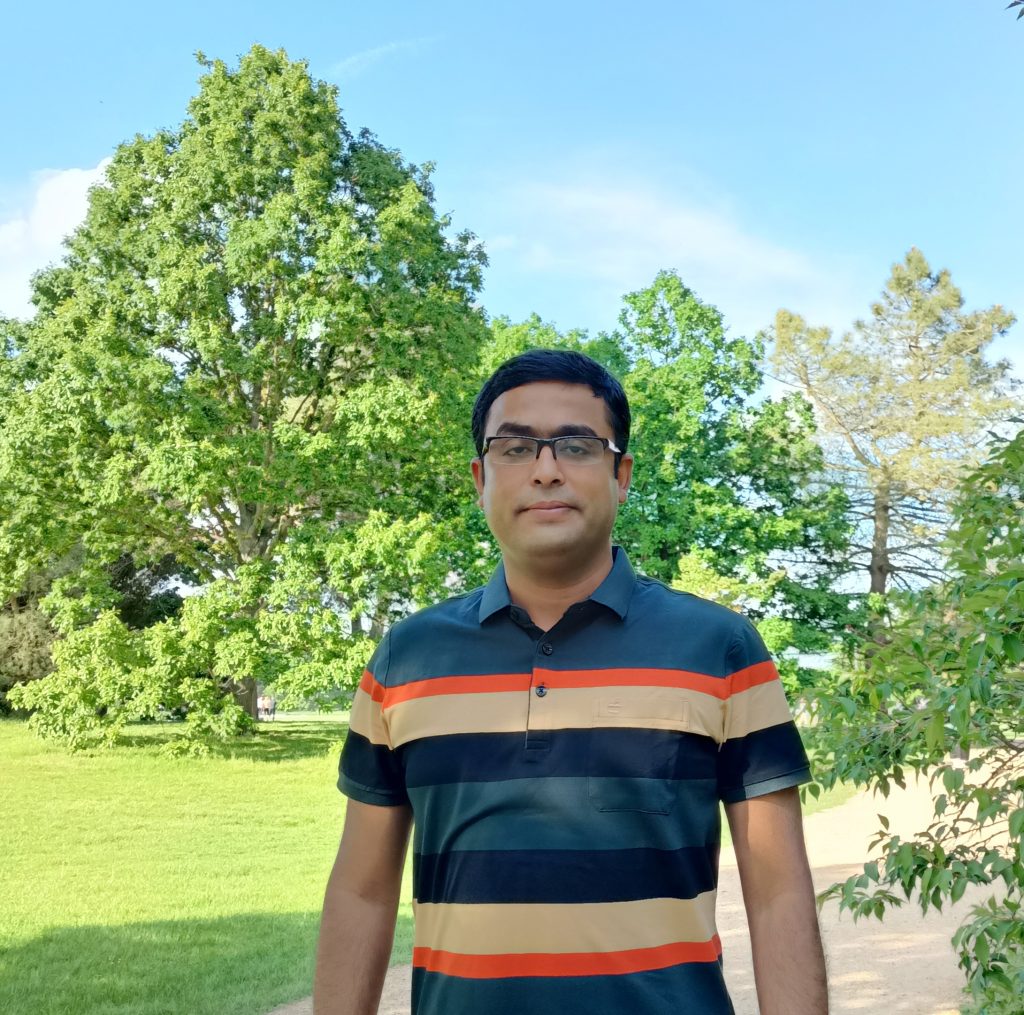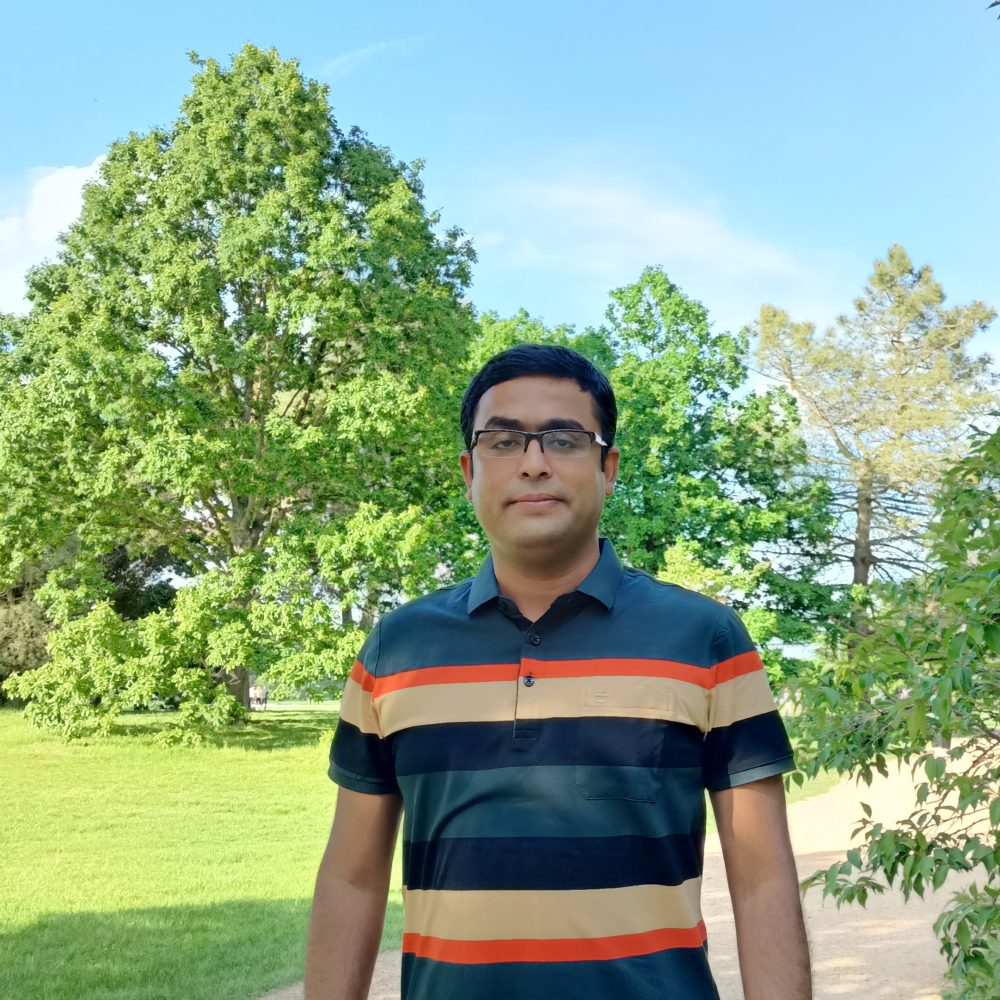Mizanur Rahman is a full-time student on the MSc in Applied Linguistics and Second Language Acquisition course. Before studying at the department, he completed a B.A.(Hons) in English Literature, and an M.A. in Applied Linguistics and English Language Teaching (ELT) at the University of Dhaka, Bangladesh.
What degree did you apply for and why was it important to you to study this?
I applied for an MSc in Applied Linguistics and Second Language Acquisition in the Department of Education, University of Oxford. I have taught English as a Second Language and, French, Bengali and Spanish as foreign languages at tertiary level for several years. As a result, I have developed an interest in understanding the cognitive process underlying second/foreign language learning. This course would allow me to explore the theoretical and pedagogical knowledge as well as the current trend of empirical research within this field to enhance my existing expertise. In addition, I was also intrigued by the name of the program which is an “MSc”, not an “M.A.” nor an “M.Ed.” and its more scientific empirical approach to the subject.
What do you hope to go on to do once you’ve completed your postgraduate degree? What do you hope to achieve?
My immediate plan upon the completion of this ongoing postgraduate degree is to pursue a PhD program in (language) education. My research interest includes incorporation of educational technology in language teaching; acquisition of first language and second language; internationalization of higher education and English Medium Instruction (EMI); content language integrated learning; language education policy; assessment, testing and evaluation. I aim to find a supervisor with similar research interests who would be willing to supervise my proposed thesis. My long-term goal is to become an expert academician at the tertiary level and provide a widespread contribution through my research work related to second/foreign language acquisition. I also aim at collaborating with national and international organisations who have also been focussing on achieving sustainable development through improving quality education in general, language education in particular.
What do you most value about the teaching at the department?
The thing I value most in the department is the highly qualified and internationally recognized extraordinary team of teaching staff. I find the teachers very humane, cooperative, and passionate about their teaching. They are well-organised and properly prepared for each of the lessons they teach. I really appreciate the way they maintain the teacher-student relationship. In fact, I have learnt several characteristics of good teaching practices which I intend to nurture in my own academic life.
One of the most important things I have learned from the department is the ability of critical thinking. Initially I struggled a lot with critical thinking. However, with the continued encouragement from my teachers, I feel I have developed valuable skills in critical thinking and analytical reading. I have also developed a thorough knowledge of different paradigms of research as a result of attending the courses on Statistics, qualitative research and quantitative research.
Why do you think it’s important to study education?
The study of education encompasses a broad spectrum. It includes a wide range of interdisciplinary subjects to meet the diverse needs of people from different disciplines, for example to become a frontline teacher or an education policy maker. The future students in the department of education will be able to study both theoretical and applied courses. Successful completion of an education degree will develop their theoretical and pedagogical knowledge through current education literature and seminal research works. This will increase their subject knowledge, enhance their critical thinking and problem-solving skills, as well as help master a wide range of transferrable skills including communication and presentation skills. They will be able to study the learning processes and techniques which are conducive to educate people and make them fit into their unique social and professional milieu and thus make a significant contribution for making a better world in the future.
What’s the community (student & staff) like at the department?
The department has an amazing group of people (both students and teachers) from diverse cultural, academic, and professional backgrounds. I find the community as a close-knit family.
Due to growing up in a remote village, being raised by an underprivileged family, and suffering from chronic physical challenges (Cornea problem), my early life was a time of neglect, social isolation and deprivation. Consequently, I grew up as a shy and introvert person who has been suffering from inferiority complex for quite a long time. Thus, my road to the University of Oxford as a first-generation postgraduate student was not a smooth one. So, I struggled a little to interact and socialise with people at the university initially.
However. both my classmates and teachers have made me feel at home and helped me move forward. All my peers are very friendly, welcoming, and cooperative. Once I overcame my initial apprehensions, I was able to easily interact and socialise with them. The administrative officers of the department are also very amazing. Whenever I have faced any issue, academic or personal, I could rely on them to help me. I knew that they would be able to help me out of any issue affecting my academic activities and my mental well-being.
What has your degree taught you most?
The degree has so far equipped me with both theoretical and pedagogical knowledge essential for becoming an expert second/foreign language teacher. It has also enhanced my ability of critical thinking and developed my skill of academic writing. I have significantly increased my knowledge about both quantitative and qualitative research as well as mastered the skills to use several statistical measures and various software to manage and process research data. Now I feel very comfortable to venture on any new research project, either qualitative or quantitative.
How do you get involved in other research activities within the department and what are they?
The department offered an ample opportunity to get involved with different research groups. I have joined one my professor’s research group related to EMI. In addition, I attend the weekly departmental quantitative and qualitative research workshops/seminars in which both seasoned academicians and current /ex-DPhil students often share their research works. I have found these workshops/seminars are a great opportunity to listen to other researchers and learn from their approaches. One of our professors oversees an applied linguistic journal and he has encouraged us to submit a short summary of our ongoing research so that it can be published in that journal. This is currently work in progress.
What’s your favourite thing about studying at the department?
My most favourite thing about studying at the department is the opportunity to meet all the talented people with diverse academic and professional backgrounds and learn from each other through scholarly insightful discussion either during the workshops or during the leisure breaks. I also value our education library which is my favourite place in the department.
How has the department supported you through your study?
The department has been very supportive to me since the very beginning of my application by providing me with all the necessary information that was needed. I am amazed at their sincerity and dedication.
Do you have a mentor in the department, and if so how has this helped you?
Yes, my academic supervisor is also my mentor. Since the beginning of my course, he has been one of my biggest supporters. I could discuss with him all the challenges, either academic or non-academic. He has always encouraged and motivated me. Even when I had difficulties with my writing, he did not make any negative comment to dampen my spirit/confidence. Rather, he encouraged and supported me to improve.
What advice would you give to new postgraduate students on how they can get involved in the department community?
Well, it is very likely that the new postgraduate students, especially those who are not familiar with UK education system, might find the short duration (8 weeks only) of each term very intense, especially with the long list of weekly suggested reading which can be very frightening and overwhelming. My recommendation for them would be that this should not demotivate them. They should make a proper budget of their time, make the maximum use of the education library, find some time to socialise with students from different pathways of the department, and allow time to meet some of the amazing people of the department. Even though it is not compulsory, they should also try to attend each of the lunch time seminars and other workshops. This will help them immensely to learn more about ongoing research activities in the field and will greatly benefit them in their own dissertation writing.
What further opportunities have you gained so far through or as a result of your degree?
I have been able to increase my connections and network with many talented ex- as well as current students from different pathways of my department. I believe this network and connection will help me find better opportunities in future. I have already been offered two jobs for teaching Bengali as foreign language by two reputable universities. In addition, this degree has added to my credentials and helped me promote my textbooks for teaching Bengali. Several universities have shown interest in using my books for teaching Bengali as foreign language. I am very much optimistic that this degree will assist me to land on my dream job in due time.
Did you receive any financial help through the University and if so what was it?
I did not receive any direct financial help, but I received financial support indirectly from Jesus College. I was supposed to stay in the newly constructed Cheng Building of Jesus College. Unfortunately, the construction company could not complete their work on time. So, my college offered me alternative accommodation in the Marriot Hotel for almost five months as well as free meals within the college until the Cheng building opened.

Whenever I have faced any issue, academic or personal, I could rely on them to help me. I knew that they would be able to help me out of any issue affecting my academic activities and my mental well-being.






